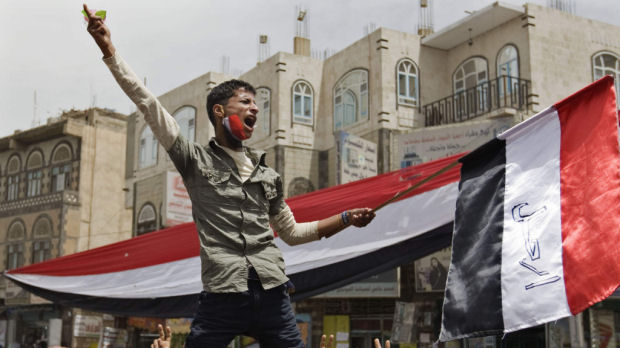Days of rage: Yemen peers into the abyss
Poverty, tribal divisions, and an ossified political system have pushed Yemen to the verge of chaos and civil war. We look at the main players in the present unrest.

Weeks of anti-government protest prompted the UK embassy in Sana’a, the Yemen capital, temporarily to withdraw part of its team towards the end of March.
But unlike many of the other countries currently facing political upheaval, Yemen – poorest of all the Arab countries – has long been identified as a basket case on the Arabian peninsular.
Writing for Channel 4 News in January 2010, Foreign Affairs Correspondent Jonathan Rugman characterised it as “a poorly governed, tribally organised, desperately poor country facing an insurgency in the north and a secessionist movement in the south.”
At the same time, its location – south of the Suez Canal and bordering Saudi Arabia in the north – makes Yemen strategically important. What is more, Al-Qaeda in the Arabian Peninsula (AQAP) poses an increasing security concern.
“A power vacuum is likely to leave an already very fragile Yemen open to further fragility, leaving AQAP open to exploiting internal grievances and a lack of an authoritative commander and figurehead,” according to Benedict Wilkinson, head of security and counter-terrorism at the Royal United Services Institute.
Two Tribes
The tribal dimension is central to Yemen politics. The president, Ali Abdullah Saleh, has managed carefully to play the Hashid and Sanhan confederations, the country’s two main tribal groupings, in the course of his 32 years in power.
Tribal allegiances also determine the position of the Yemen military, which has thus far been largely supportive of the protest movement. On the other hand, the elite Republican Guard led by the president’s son, Ahmed, has remained loyal to the ruling regime. Tanks and military vehicles belonging to the Republican Guard have been deployed around the presidential palace in recent days.
President Saleh has dominated politics in Yemen since 1978. Benedict Wilkinson calls him as “a very intelligent player of his country’s tribal politics and of the political system”. Saleh also enjoys the support of Yemen’s intelligence services, including the feared Political Security Organisation, whose membership some estimates put at up to 150,000.
When turmoil erupted this year in Tunisia, and then in Egypt, Saleh tried to pre-empt further political unrest in his own country by announcing on 2 February that he would not run for re-election in 2013 and that his son would not succeed him.
But Yemeni politics were further polarised when an estimated 52 protesters were shot dead in the capital, Sana’a, on 18 March. Three days later General Ali Mohsen al-Ahmar, commander of Yemen’s north western zone and a powerful relative of the president, pledged his support and protection for the protesters. President Saleh subsequently announced that he would step down by the end of this year.
Compromised status
Analysts suggest that Mohsen, a member of the Sanhan tribe and hitherto a symbol of the status quo, has been marginalised in recent years by the concentration of power around President Saleh’s son, Ahmed Ali Saleh, and his nephews. His rivalry with Ahmed Ali, a commander in the Republican Guard, is thought underpin internal unrest along the border with Saudi Arabia.
It may be, however, that Mohsen’s compromised status has undermined his influence and divided protest. “Ali Mohsen is an influential player,” says Benedict Wilkinson, “but I think his influence has been somewhat overstated recently. His ties with the opposition mean that his resignation is probably not surprising.”
Just as influential to Yemen’s future direction are the al-Ahmar brothers, Hamid and Sadiq. Sadiq, who has announced his support for the protest movement, heads the Hashid tribal confederation.
Business tycoon Hamid al-Ahmar is an established opposition politician and senior official in the Islah party. He is said to have used his wealth to bankroll the grassroots activities of opposition activists. He also owns a TV channel which broadcasts updates on regime defections – of which several have been reported in recent weeks.
Links to Bin Laden
Another focus for the opposition in Yemen is academic Abd al-Majid al-Zindani, whose links with Sunni fundamentalism even extend, according to one source, to Osama bin Laden. It may be that a post-Saleh political agreement will have to involve Zindani, Hamid al-Ahmar, and General Mohsen.
Yemen’s future remains impossible to call. Latest reports say President Saleh is engaged in serious negotiations over the timing and conditions for an end to his 32-year rule. “My feeling is that President Saleh won’t go easily – but that doesn’t mean he won’t go,” says Benedict Wilkinson. “And that doesn’t mean the Saudis can’t put pressure on him.
“But there are so many different factors involved in whether he can maintain support internally and externally, that anything could happen.”